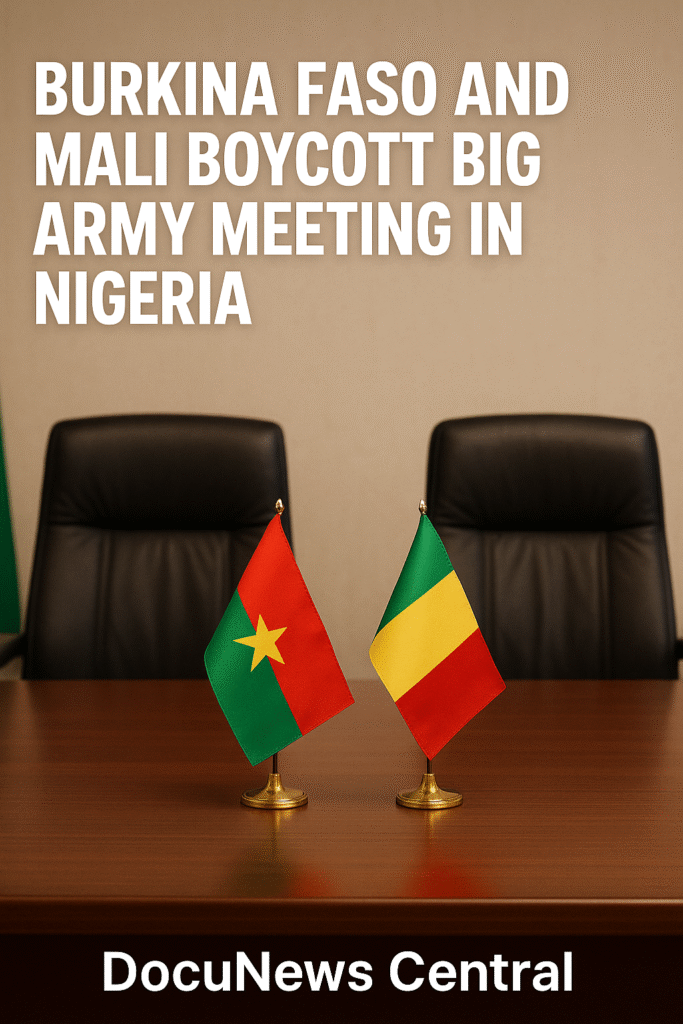
Burkina Faso and Mali Boycott Big Army Meeting in Nigeria
No Show at Big Military Talks
A big military meeting took place in Abuja, Nigeria on Monday. It was meant to bring together African defence chiefs and army leaders to talk about security in the region.
But two countries — Burkina Faso and Mali — did not send any delegates. Their seats at the table were empty.
This absence raised eyebrows because the meeting was called at a time when West Africa is facing many security problems like terrorism, banditry, and political tensions.
Why Did They Stay Away?
The two countries are run by military leaders who took power through coups. In recent months, they have been moving away from their neighbours in the ECOWAS bloc (Economic Community of West African States).
Instead, they formed their own alliance with Niger, called the Alliance of Sahel States (AES). This group believes ECOWAS has not treated them fairly, especially after sanctions were placed on them when soldiers took power.
So when Nigeria invited all defence chiefs to Abuja, Burkina Faso and Mali chose not to come.
Niger Came, But With Low Rank
Even though Niger is also part of the AES, the country still sent someone — but not a top general. Instead, Niger was represented by its defence attaché in Abuja, Colonel Major Soumana Kalkoye.
This showed that Niger did not fully boycott, but also did not give the meeting high importance.
Tense Relations in the Region
The decision of Burkina Faso and Mali not to attend shows how divided West Africa has become.
Many of the leaders in ECOWAS want to keep the region united against terrorism. But the AES countries feel they are better off standing alone.
Observers say this tension could make it harder to fight armed groups that kill and kidnap people across borders. Terrorists do not care about political blocs, but soldiers do — and this makes cooperation weak.
Nigeria’s Role as Host
Nigeria, as the biggest country in West Africa, called this meeting to build trust and push for unity. The Nigerian military is under pressure because insecurity has spread from the Sahel down to its northern states.
Nigeria hoped that all its neighbours would come together. But the empty seats of Burkina Faso and Mali sent a strong signal that the region is far from united.
Voices From Experts
Analysts who spoke to reporters said the boycott was “not a surprise.”
One expert explained:
“These countries no longer see ECOWAS as a friend. They are building their own path with the AES. By not showing up in Abuja, they are telling the rest of the region that they have cut ties.”
Another analyst said:
“This is very dangerous. Terrorism grows when countries do not work together. If they keep pulling apart, ordinary people will suffer more.”
The Bigger Picture
The boycott is also part of a bigger power struggle. France, which used to have strong military influence in West Africa, has been pushed out of Mali, Burkina Faso, and Niger. The AES countries are now working closely with Russia for weapons and training.
Meanwhile, Nigeria and some ECOWAS members still work with Western allies like the United States, Britain, and France.
This shows that the region is split not only within Africa but also along global power lines.
What This Means for Ordinary People
While leaders argue and blocs fight, ordinary people in villages and towns continue to live in fear of attacks.
Families in Mali, Burkina Faso, Niger, and Nigeria suffer from kidnappings, bombings, and raids by armed groups.
The Abuja meeting was supposed to find ways to make joint plans against these threats. But without Burkina Faso and Mali, the talks were incomplete.
The Road Ahead
It is still not clear if the boycott will continue in future meetings. ECOWAS has said it is open to dialogue. But the AES has shown no sign of returning to the bloc.
For now, West Africa faces two paths:
A united fight against insecurity
Or a divided region where each bloc fights its own battles
DocuNews Central View
At DocuNews Central, we believe this boycott should not be taken lightly. It shows that the dream of a united West Africa is under real threat.
If leaders do not find common ground soon, the ones who will pay the price are not the presidents or generals — but the millions of ordinary people in villages and towns across the Sahel and Nigeria.






